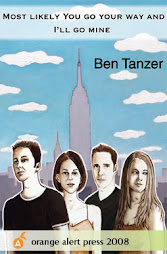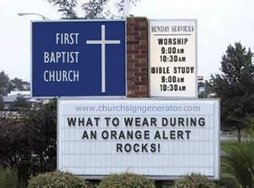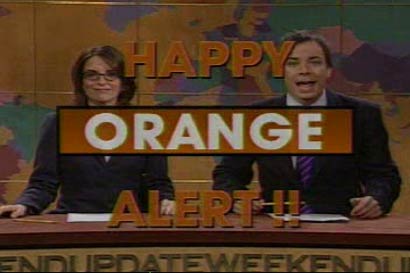
After finishing the Rowan Scarborough book, Sabotoge : America's Enemies Within the CIA, I thought we would end Summer and start up the Coffee Talk with the ideas and evidence based within this book.
As a quick summary, Rowan Scarborough uses 216 pages to lay out his evidence from investigative journalism to prove that members and former members of the CIA are involved in partisan politics and are using classified information to discredit and attack the White House Administration through leaks to the mainstream media outlets. Also included, are attacks on key Administration officials by Democrats to discredit their roles in an effort (mostly successful in my opinion) to oust those officials from office.
To go into more detail, we'll start where the book starts...with Congressman Pete Hoekstra's "secret" letter to President Bush on May 18, 2006 concerning the nominee of Steve Kappes as Deputy Director of the CIA. (Ironically, I was able to find a copy of the actual letter on the internet that was released by the New York Times in an effort to show that Pete Hoekstra was concerned about the Administration withholding key information in their inquiries with the House and Senate Intelligence Committees with Hoekstra is a part of.) Here is the letter from the NYT article and website.
Although the letter shows concern on multiple areas, the book focuses on the statement in the letter "I have been long concerned that a strong and well-positioned group within the Agency intentionally under-minded the Administration and its policies." On the 3rd page of the book Scarborough has another quote from this time Pat Roberts of the Senate Intelligence Committee remarking, "What concerns me most...is what appears to be a campaign of press leaks by the CIA in an effort to discredit the President."
Added to the CIA leaks to attack the President and the Administration were former Senior Analyst at the CIA, Ray McGovern, and CIA analyst Bill Christison who have both helped the 9/11 Truth Movement and helped propel the conspiracy theories that a missile hit the Pentagon and that 9/11 was an inside job with their founding of the Veteran Intelligence Professionals for Sanity organization. (Just type any of the three names and hundreds to thousands of articles will come up mostly from Counterpunch.org, Moveon.org, and numerous mainstream media articles they they have written and been "counter-terrorist analysts."
Then the last main players in the book are the media giants of the New York Times and Washington Post who have been publishing the damaging leaks and have helped shape the minds of Americans and foreigners alike. Some of the leaks mentioned were of reproduced parts of the National Intelligence Estimate, but only of the most negative assessments to the war according to Scarborough. (here's a list from the White House of NYT articles that they are refuting) Then the Washington Post revealed secret holding cells in Europe and elsewhere for captured al Qaeda leaders which embarrassed the Administration w/ supporting countries in the war on terror. One of the CIA sources was a Democratic John Kerry supporter, Mary McCarthy according the book.
The biggest leak was when the NYT disclosed a top secret program of instantaneous eavesdropping on suspected terrorists who were calling people withing the United States. Here's the article. Not only was this an embarrisment which Bush had to have a press conference about 3 days later, but it keyed al Qaeda into our method of NSA surveillance to track and key in on them. According to Scarborough, Hoekstra told him that al Qaeda then changed all of their communications methods to reach people within the US and it has made intercepting calls much more difficult. As a side note, in the book Scarborough quotes General Michael Hayden, who ran the NSA in 2001 as saying, "Had this program been in effect prior to 9/11, it is my professional judgement that we would have detected some of the 9/11 al Qaeda operatives in the United States, and we would have identified them as such."
This was all laid out in the first 7 pages of the book. From there he talks about how the Clinton Administration had eroded the CIA during the military cuts for 8 years in which the CIA lost at least 30% of its analytical and operating branches in Latin America and Asia. Indonesia had only 3 CIA officers by the mid 1990's (largest Muslim country). He also required the CIA to not deal with unsavory characters for sources which eliminates most of the good intelligence for terrorist organizations. Clinton also virtually stopped new recruiting by the mid-1990's, and you can see what a dire situation it is now when the CIA has commercials to recruit people on TV (as a friend pointed out while discussing this a couple days ago). Scarborough reported that if the CIA wanted good HUMINT (human intelligence) to get info from Iraq, it needed to develop those sources 20 to 30 years ago. Scarborough claims that the CIA had been in retreat since 1975, when Senator Frank Church's committee on intelligence exposed CIA misdeeds and made it difficult for the agency to recruit new agents. Instead, the CIA and intellligence community had to rely on defectors and sources that would lie for money or security. (See any intelligence report and you'll see the kind of people that were our sources) Phase II of the Select Committee on Intelligence discussing WMD Programs or Information used from the Iraqi National Congress
To top everything off, (and in my opinion is the most telling of the Democratic attacks on the Administration) the committee that was assembled to inquire into 9/11 and the War in Iraq, of which I put copies of Phase II reports above and Phase I below, were engaged in a partisan battle started by the Democrats and an internal memo that basically states that they would try to "castigate the majority for seeking to limit the scope of the inquiry", leak promising leads to the media, and then whatever the committee finds, demand another investigation into the same matters by an independent body - and do it on a schedule that coincides with the election. Here are two congressional records discussing this. Nov 5, 2003 w/ details of the memo Nov. 7, 2003 discussion continued
So not only does he paint a picture that parts of the CIA are leaking information to discredit the Administration, but they could not even perform their duty of providing national security intelligence to senior US policymakers. (See Mission on the sidebar of the CIA's website) Scarborough throughout the book goes into detail on how key CIA leaks and misinformation that were either incorrect, ficticious, or otherwise have damaged the Administration. Here is a list topics which I may go into in more detail at a future time...
CIA shortfalls
Defense Department and Rumsfeld needing to create intelligence divisions w/in the Army
Ahmed Chalabi and the INC
Pres. Bush State of the Union address and the Africa/uranium reference
John Bolton, his Heritage Foundation speech and his WMD speech
Donald Rumsfeld and Gen. John Keane
Paul Pillar's speeches and book Terrorism and US Foreign Policy
Tyler Drumheller, his no WMD claim, and Curveball
Valerie Plame and Joe Wilson w/ Niger - Iraq connection
Patrick Fitzgerald investigation of of Niger-Iraq connection
Richard Armitage as source
Iran and lack of intelligence
With the apparent attack against the White House, George W. Bush and his Administration by members of the Democratic party and their supporters, how do you think the media has impacted your view of the US government in general and the current President in particular?
How has the emergence of the Internet and blogs like this one coupled with the rise of conspiracy theories relating to the media press releases, CIA leaks and anti-war advocates affected your opinion of the US government, the President and the War on Terror?
How has this posting affected your view of the media, the Democrats, and internet based articles?
Talk amongst yourselves.
+by+Nick+Volkert).jpg)






















 Here is a great graph I found
Here is a great graph I found 




















